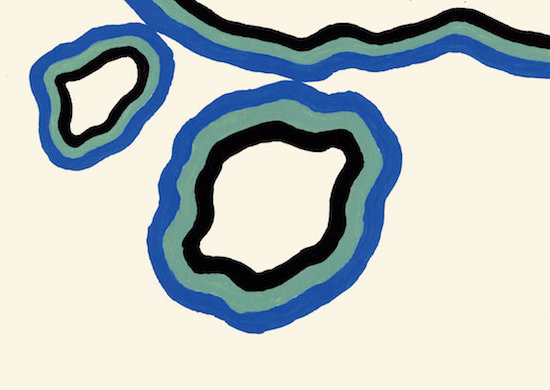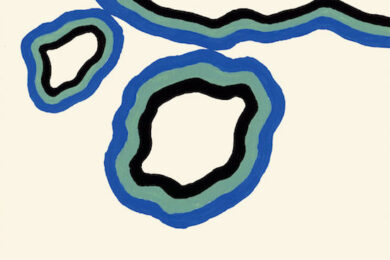A note about this month’s mix – it starts with a track by Canadian artist C Diab, whose Exit Rumination was one of tQ’s albums of the month back in March. A PR (naming no names) accidentally sent me the files for his album instead of the one I’d requested, and I only realised the error rather late in the process of putting together this column. Now I like ‘Old Red’ opening the mix, so C Diab is staying there – my Canadian guest. He joins artists from the releases reviewed below plus a selection from Toulouse pysch rockers Sift’s debut album; woozy funk from Maxim; Frédéric D Oberland (of Oiseaux-Tempête and more) on Nahal, his new label with Mondkopf; ‘coldcore’ trio Ruines and electronic pop duo Agar Agar – of which more on The Quietus very soon.
Piles – Una Volta (Aagoo/Rev Lab)
& Club Cactus – S/T (Beg Rose)
Drums! Lots of them! Both of these releases are the fruits of collaborations between multiple drummers – two in Club Cactus and three in Piles – and there’s crossover between the personnel, with Anthony Laguerre (also of Filamotsa and Myotis) appearing on both records. Piles also feature Michel Deltruc and Guigou Chevenier, a founder member of the highly idiosyncratic Etron Fou Leloublan and hence a key figure of the 70s French underground.
Club Cactus – Laguerre with NLF3’s Jean-Michel Pires – is the slightly more song-y of the two projects, and features numerous guest vocalists including The Ex’s GW Sok, Bed’s Benoit Burello, Pascal Bouaziz and Marie Camboise. There’s no swing to Club Cactus – the duo favour pounding machine rhythms enhanced by tuning, distortion and varying amounts of reverb. The drums ’n’ voice ’n’ abstract noise approach sometimes recalls Siouxsie Sioux and Budgie’s The Creatures, particularly the rolling, pitch-switching toms of ‘Une Cigarette’, but ‘Religion’ (with guest Alexei Moon Cassell) is a lurching gesture in the direction of (t)rap, the title tracks kicks in like hardcore techno and ‘Beautiful Again’ even has shades of U2.
Una Volta, which is packaged with a 32-page booklet of abstract imagery drawn from a Bas Mantel stop-motion video called ‘Drones and Piles’, is as un-swingy as Club Cactus and even more pared down to essentials – although other noises creep in, like the chimes on ‘Decay’, the growling guitar on ‘Mort Aux Cons’ or the sliver of electric humming running the oblique motorik of ‘Kraut And Piles’. On a shorter track like ‘Ulrik’, the variations in rhythm, timbre and pitch alone are enough to hold your attention, yielding a rather singular, angular beauty. ‘Marie’ is nine hypnotic minutes consisting almost entirely of cymbal work.
In short, if you want to hear drums sounding really fucking cool then these are the French releases for you.
Etienne Jaumet – 8 Regards Obliques (Versatile)
(
Now that jazz is exceedingly fashionable again, we’re possibly going to have folks from various walks of musical life playing up their jazz influences. Given Jaumet’s wide-ranging interests this is far less of a stretch than it might be in some cases; the really notable thing about 8 Regards Obliques – seven takes on classic jazz numbers, from Miles’s ‘Shhh/Peaceful’ and ‘Caravan’ to Art Ensemble of Chicago’s ‘Theme de Yoyo’ and Sun Ra’s ‘Nuclear War’, plus one original of his own called ‘Ma révélation mystique’ – is how un-jazzy it is, even relative to The Comet Is Coming’s dialogues with electronic dance music.
Rhythmically, Jaumet cleaves to the kosmische and techno influences that have informed Zombie Zombie and solo albums like Night Music, with four-to-the-floor dominating, leaving the saxophone as the main jazz ‘signifier’. One might argue of course, as many do today with good reason, that jazz should be considered more an approach to playing and a mentality than a particular sound. Here the thrust is that 8 Regards Obliques’s jazzy spirit, actual tunes aside, lies in the fact that that the tracks were laid down roughly and spontaneously (in less than three weeks, still an age compared to the single session that resulted in, say, In A Silent Way) but that approach could equally point to kinship with a lo-fi indie rock record.
Actually, the most ‘jazz’ thing here is the way Jaumet treats these melodies the way jazz players treat standards, or any other pre-existing compositions for that matter – as a jumping-off point and as material to be repurposed in their own idiom. On 8 Regards Obliques the toplines are played on the sax (and Jaumet does improvise, of course) and they roll over gleaming, gliding cosmic synths and thin ’n’ crispy analogue beats. It’s occasionally striking and often enjoyably kitschy, with the take on Ornette Coleman’s ‘Theme From A Symphony’ coming out on top for successfully channelling some of the original’s madcap energy.
Flavien Berger – Contre-Temps (Pan European Recording)
‘Insouciant’ is an adjective that’s undoubtedly overused for French artists but it’s entirely appropriate for describing Berger’s vocal presence, and indeed his general demeanour. On stage he is almost disarmingly casual and unfiltered, but this disguises a restless, touche-à-tout disposition, a desire to follow his muse and rather impish humour wherever it leads – even if that’s into the rather odd middle ages pastiche ‘Medieval Wormhole’, somehow related to the album’s time travel theme.
Contre-Temps is the follow-up to his 2015 debut, Léviathan also on Turzi’s Pan European imprint. It still features Etienne Daho-like pop in ‘Maddy La Nuit’ (Berger features on Daho’s recent album Blitz) and stretches of bubbling synth work like ‘999999999’, but also adds some particularly languid takes on nu-soul. Contre-Temps is more focused than Léviathan, with an increasing ambition most evident on the title track (a 14-minute duet with Bonnie Banane), but Berger still appears to be trying out and toying with masks that are by turns serious, silly and self-aware; ‘Deadline’ begins with the lyrics “Je ne vais pas vous faire un album en deux jours” (“I’m not going to make you an album in two days”) to which a chorus of Flaviens replies “Mais si, mais si, mais si!” (“Of course you will!”). The Moon Safari-esque bass and canny details in the production, like the interlocking, pitch-shifted vocals on ‘Deadline’, are genuinely seductive too.
Léonie Pernet – Crave (InFiné)
Pernet made her name as a DJ and organiser of queer night Corps Vs Machine, while drumming for the likes of Yuksek. After two EPs on Kill The DJ, the 28 year old has switched to InFiné for her first album release. The darkness of her techno sets remains but the sepulchral tone here (even the relatively peppy single ‘Butterfly’ is pretty maudlin) bears the influence of the gloomier end of new wave, the kind that takes you under its cloak and pumps sweet venom into your veins until you’re hooked, drugged by sadness – Crave indeed. This is balanced, however, by a feeling of spontaneity, production that isn’t overcooked and vocal melodies that seem to have been approached in the spirit of first thought, best thought.
It’s what some call synth wave nowadays I guess but it’s a mode and a mood that Pernet has some fresh takes on. Orientalism has been part of the goth/’dark 80s’ playbook pretty much since the off (as a supplement of otherness, mystery, violence and intoxication) but Pernet, whose father was of Antillean and Tuareg heritage, approaches ‘world music’ more thoughtfully. On ‘Auaati’, childhood friend Anna Wassim contributes gorgeous vocals in Arabic over Middle Eastern percussion, and ‘African Melancholia’ is written from the perspective of a refugee.
Nova Materia – It Comes (Crammed Discs)
The duo of Caroline Chaspoul and Eduardo Henriquez emerged from Franco-Chiléan disco-punk band Pánico – whose final album Kick was released on Chemikal Underground in 2010 – inspired by the sounds of stones and metal collected in the Atacama desert in northern Chile. Initially used for an experimental recording called Resonancia, the metal and ‘mineral materials’, with their unconventional harmonics, join synths and a doctored guitar on the more accessible, dancey debut album proper It Comes.
It makes for quite the live show, with contact mic’d stones, metal plates and steel tubes scratched and set upon with hammers, and on record they bring the dynamism and detail without which these tracks might be merely serviceable electro jams. Extra frisson is provided by Chaspoul and Henriquez trading and overlapping their vocal contributions (as well as inviting Tristesse Contemporaine’s Narumi Herisson to provide Japanese lyrics on ‘Kora Kora’), yelping and crooning calling and responding, as they negotiate the rugged soundscape.
Rockfort Quietus Mix 14: C Diab – ‘Exit Rumination’ (Injazero); Club Cactus – ‘Une Cigarette’ (Beg Rose); Piles – ‘Kraut And Piles’ (Aagoo/Rev. Lab); Sift – ‘Ant Skull’ (Stolen Body); Ruines – ‘Tank Payyekti’ (Aristocrate/Skate Pizza); Léonie Pernet – ‘Rose’ (InFiné); Etienne Jaumet – ‘Theme de Yoyo’ (Versatile); Nova Materia – ‘Follow You All The Way’ (Crammed); Agar Agar – ‘Lunatic Fight Jungle’ (Cracki); Flavien Berger – ‘À Reculons’ (Pan European Recording); Maxim – ‘Sunny Sunday Morning’ (1178); Frédéric D. Oberland – ‘La Part Du Feux’ (Nahal)



